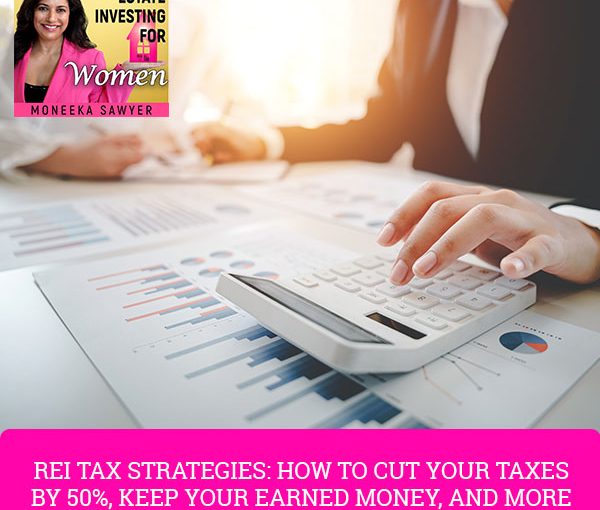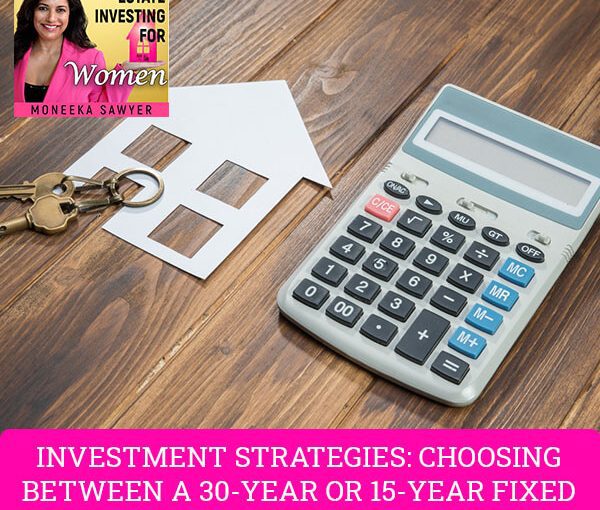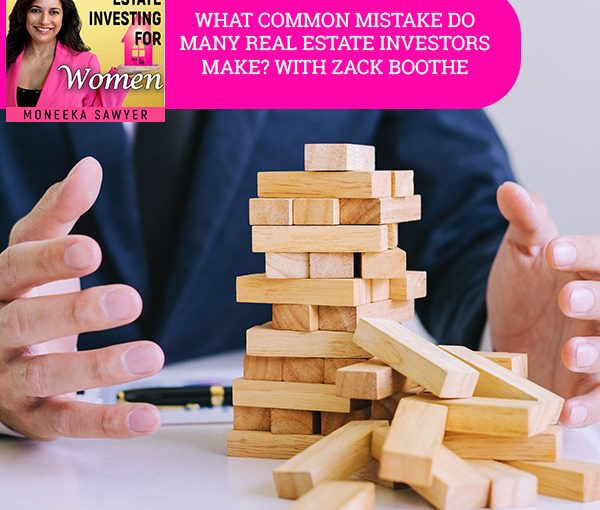REI Tax Strategies: How To Cut Your Taxes By 50%, Keep Your Earned Money, And More With Lorraine And Jim Conaway
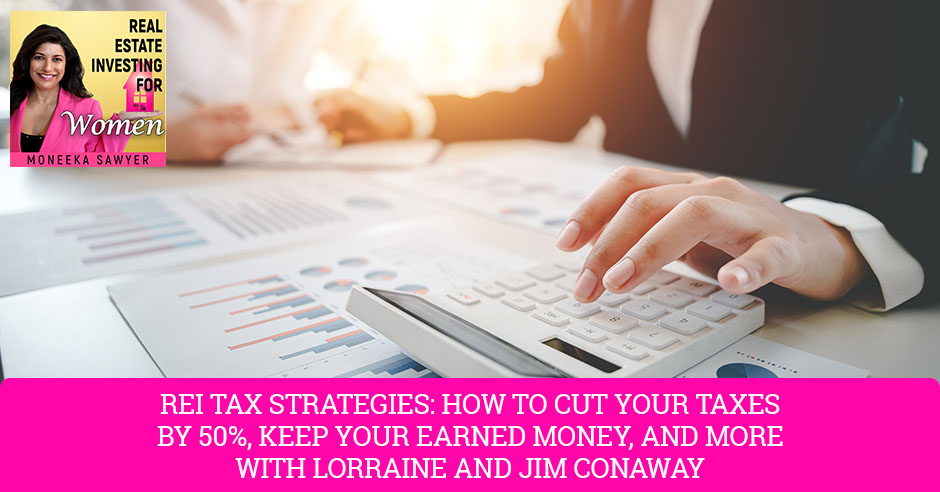
Taxes are inevitable, especially as an entrepreneur and investor. But it doesn’t have to be so difficult and painful to deal with; with the right strategies, you can even cut your taxes by up to 50%. Today we have Lorraine and Jim Conaway to share with us the different REI strategies for reducing your taxable income, keeping the money you earn, and more. Lorraine and Jim share their financial experience and how they have helped many clients with their tax strategies and saved them a lot of pain. They also share their journey in the industry—the ups and downs—and how, through the years, they have discovered what really matters to them. Don’t miss the opportunity to start controlling your finances smartly. Tune in now!
—
Watch the episode here
Listen to the podcast here
REI Tax Strategies: How To Cut Your Taxes By 50%, Keep Your Earned Money, And More With Lorraine And Jim Conaway
Real Estate Investing For Women
Using their extensive experience, knowledge, and success in the world of tech strategies, real estate investing, and other wealth vehicles, Jim and Lorraine used their straightforward, big-hearted style to guide thousands to ignite their unique wealth formula. With decades of success, in designing and implementing customized wealth solutions, they appreciate that success is truly about education support and the art of supercharging your unique style of wealth accumulation. —Jim and Lorraine, welcome to the show again. How are you?We’re doing great. How are you, Moneeka?
I’m so glad to have you guys here.
Moneeka, you were doing such a great thing for your entire community. I tuned in to a couple of your shows, and they’re so informative. They’re very educational and they’re there to help your community. That’s just really good that you’re doing that for women. I love it.
Thank you, Lorraine. Every once in a while, I’ll be like, “I don’t feel like recording now.” Recording is my favorite thing to do, just so you know. When I have those moments, I’m like, “I want to see my ladies,” so I get out there and I do it. It really is fun for me. Thank you for that. Lorraine. You and Jim are two of my favorite people in the world, but Jim, I do like Lorraine better. I want you to know that.
I’m used to people feeling me that way.
You probably feel that way, too. I think so.
When somebody likes the bad dad joke-type approach, then I become the favorite.
I think my husband prefers you, but I’m a fan of Lorraine. Lorraine is a friend of mine. I feel like we’re really close friends. I love you, guys. I recommend you frequently to my ladies. One of the things that have come back several times is, did you know they’re being sued or did you know they’re being investigated? My ladies, through my direction, have been taught you have to do your due diligence. I can only recommend so much, and then you have to do your due diligence. I have to confess, I’m proud of them for coming back to me with that. They helped me to find other people that I might have on my show who do have issues that I didn’t know about.
It’s a great community thing that we all keep our eyes on the ball for each other and people keep me informed. The issue here for me is that I know you and your integrity. I personally do business with you and I love you, guys, personally. I know that in this particular case, interesting, bad things happen to really good people. I would like you to help us to understand what happened so my ladies know the story the same way that I do.
I wanted to share the story because it is the actual of what happened. Jim and I were very excited to be faculty for a New York Bestselling Author way back in ‘08. We still have that amazing relationship now. What happened is we were financial planners at that time, and we personally have been real estate investors. In 2023, we will be 29 years that we’ve been real estate investors. Back then, we were real estate investors and we were financial planners, and we came across turnkey real estate. We went out and visited these turnkey providers, and they said, “If you allocate part of the portfolio to real estate, which we love real estate, and I’m sure your community does, too, you can also get a referral fee and expand our business model.”
We said yes. We had so many people that the vendors couldn’t keep up, so we expanded to new vendors providing turnkey real estate. One vendor couldn’t scale up, even though he said, “I can do it.” We flooded him with clients. It took one client, a niece from Germany who visited her aunt, and said, “What? Your property is not rehabbed. It’s not finished. We are going to sue the vendor.” They sued the real estate developer. What was really sad is they sued title, escrow, us, and everybody. It was like, “We got included in that, and we didn’t get paid. We weren’t the developer.”
It came out because we were securities licensed at that time. It triggered an examination from FINRA. That’s how this whole bad news came on the internet because we were securities licensed. It did get closed and the developer had to buy the properties back. It’s all public record. Jim, do you want to explain what FINRA is and that whole sanction?
FINRA stands for Financial Industry Regulatory Authority. I’m going to read this quick little paragraph from the document, the final agreement that we came to.
It’s from our attorney, FINRA, and us, where we all signed.
James and Lorraine Conaway failed to timely and completely disclose the scope of the real estate related outside business activities. In other words, outside business activity is that activity, which is not directly regulated by FINRA or any securities real estate, to their FINRA-registered firm. They also provided their firm with inaccurate information about the outside business activities in response to an investigation of them. As a result, they violated FINRA rules 3270 and 2010. Now, if that doesn’t sound a little innocuous, I don’t know what does. Basically, what they’re saying is that, not that we didn’t disclose things, but we didn’t disclose them adequately enough.
The issue boils down to, further in the letter, the Conaways at the Conways’ direction, Tycon, the company that we used to be associated with. It attempted on an ongoing basis to track the progress of rehab on the client’s properties and coordinate with GK to confirm the scheduled rehab work was being done as agreed. It monitors the client’s rental properties that were not performing or underperforming and directs GK to address client grievances. As you can tell, we were accused of having done a good thing.
When you Google our name, there are lots of attorneys who would love to be able to sue us for all kinds of strange things, so they exaggerate these things or word them in very aggressive fashions. The sanctions boiled down to a nine-month suspension of our securities licensure after we had already surrendered our license, and a $10,000 penalty or fine if we chose to reenter the securities industry. That’s it.
The bad thing that we did was try to help clients who were delayed in the rehab of their property. I have to tell you that’s very heartbreaking for us being in the financial industry for over a quarter of a century and having a sterling record. Even multiple decades of having audits and coming out spectacular on our audits and then having this one incident with this one client on this property triggered this whole thing. That’s what happened.
It's heartbreaking to be in the financial industry for over a quarter of a century and have a sterling record, only to have one incident with one client destroy your reputation. Share on XBy the way, further into the document, they actually identified five transactions that were inadequately disclosed. One of those transactions was with a principal of our own firm. With that said, the lesson that I would like for people to take from this is when you are an entrepreneur and you have any level of success, you get a target painted on your back.
Jim, please complete the thought and I’ve got something to contribute there.
Once you’re under pressure and have an issue arise, you’ve got to be resilient and figure out how to pivot. That’s where the tax thing came from.
The one thing that I want to contribute quickly here is I love what you said there, Jim, about success breeds success. It also breeds jealousy and many other things that are not as awesome as we would like. We’ve had people on my show several times talking about protecting yourself, creating entities, and doing all of those things because these things happen. My outlook on life is bliss. I like to believe that everybody’s got the best intention in mind.
Some people, for whatever reason, either they’re desperate or something happens, they express their anger in this way. I know a lot of people that have really good business practices, and this happens, too. That’s why we recommend, ladies, that you protect yourself. This happened to you, guys. Thank you so much for being so transparent about exactly what happened.
It is what it is. People who do business with us should know we don’t handle and touch people’s money. We never have and never will. That’s not us. Just a fun little factoid, if anybody wants to know. One of the people who used to sit on the board of directors for FINRA was a guy by the name of Madoff. Do you remember him? Just saying. These guys are not perfect by any stretch of the imagination.

Tax Strategies: People who do business with us should know we don’t handle people’s money. We don’t touch people’s money. We never have and never will.
The other thing is that in the financial industry regulated by FINRA, they are not under the Constitution of the United States. The Constitution says you are innocent until you are proven guilty. In this format, you are guilty until you are proven innocent. It’s a different world.
It is so different. Please understand that if somebody is securities licensed, every email they send is read by Big Brother. They have to get permission to do things like that. When Lorraine and I were confronted with this whole issue back in 2015 and 2016, we really sat down and took a look at it and said, “This is a set of headaches we don’t need and want.” It has been an absolute shift. We now have constitutional rights. What an amazing experience that is.
You guys know that I released all of my licenses. I had a life insurance license and a real estate license. I was regulated by everybody, too. I just let them go because it turned out to be too many more disclosures, especially in California. I was having to sign over my left arm to talk to anybody about a property. I really do get it. I’ve let go of all of mine, too. It’s released so much pressure from my life, too. Not because I want to be dishonest, none of us want to be dishonest, but I do want to have some rights and be treated with respect.
What’s interesting I want to say and share with whoever’s reading this is that Jim and I have been very blessed. We have been asked to be on several stages, continue to be faculty, and speak in many different places. With these joint venture relationships, we have disclosed what we have done here now. The response is, “I know you, guys. The person who referred you to me, I’ve known them forever. I am so grateful that you were honest in sharing with me the disclosure that in itself is all I need.” We just keep having doors open to us, and we’re grateful for that.
I am, too, because otherwise, I wouldn’t have met you.
That’s true.
Why don’t you talk about what happened that allowed us to pivot to where we are now?
Jim and I were real estate investors and business owners. We have had employees ever since the mid-’90s, and we are taxpayers as well. First of all, when we first went independent in the ‘90s, we worked like this with the CPA for ten years, and our eyes were like, “There’s so much money in the tax return.” In our own situation, we were learning, “If you have your entity structuring, you do this and that. There are all these opportunities.” We then got certified in charitable planning back in 2001.

Tax Strategies: If you have your entity structured and use the right strategies, you’ll get all these opportunities.
It just goes to show that you were right. I’m certifiable.
It’s one of your better qualities.
We started back in 2001 focusing on the tax strategy. In 2016, we purchased a tax firm coincidentally before this whole thing happened. It was the end of 2015 when we were in negotiations. We closed escrow in 2016 in the first quarter, and then in the second quarter, this FINRA thing happened. What was interesting is that whenever people have challenges, you have a lot of real estate investors and you have entrepreneurs. When you have challenges, it really tests you. You find out a lot about yourself. Our income was, at that time, seven figures, and it got cut off in one day.
The broker-dealer said, “No, because you’re suspended.” When you have that kind of income and you have a whole staff of over a dozen people working for you, and there’s zero income coming in, you learn so much. At that time, we had bought a tax firm, and it was a small little one. Our clients were so faithful to us. They said, “Are you okay?”
That was very touching the way the clients reacted to us. The vast majority of our clients were more concerned about our welfare than their own business because they knew their business was in good shape.
We started rebuilding. We have always helped people but it was more targeted in tax strategy because that’s where we had a lot of pain personally. A lot of our clients had a lot of pain because they were way overpaying taxes. Nothing bad about accountants and CPAs and enrolled agents, they’re taught, “Let’s prepare taxes.” They get very busy with, “Give me the documents in February and March. Let me prepare the return and here is what you owe.”

Tax Strategies: A lot of clients are in pain with tax strategies because they often overpay since they didn’t know better.
For us, we have a team of tax preparers, and it’s a great marriage between the tax preparer and us who focus on the tax strategy. In addition to that, the implementation is heavy. You see those dollars and it’s exciting for us to see people save. Jim was working with somebody, and the actual savings is $148,000. Guess what he is doing with the money?
Investing.
Buying real estate.
Here’s the fun part, not only is he buying real estate, but he’s getting additional tax reductions for the real estate he’s buying from with the tax savings he’s got. He’s getting additional tax savings.
It compounds. We talked about compounding and making interest. We also talk about compounding this way. One of our favorite words.
One of the analogies I like to give people is I don’t want people to think that their tax guy is doing a bad job just because they don’t have a strategy. We have to understand that most tax people are defense players. Think soccer analogy. Your tax preparer is the goalie. Think about their language. “I need to be able to defend this. Can we justify that tax deduction?” They think very defensively. Our job is to come up with those strategies to score goals on the other end of the field and work together as Loraine suggested. That’s where the magic happens.
None of these strategies are illegal. It’s all written in the IRS code. I think people get scared, too. Why doesn’t my CPA know about this? It’s because they’re not spending their time studying all those things. The IRS code is huge. It’s enough to keep up with what’s changed each year. There’s trust code, corporate code, and real estate code. There’s so much code. Most of them will specialize, which is why usually I’ll recommend go to somebody that understands real estate. A strategist can be a little broader and look at all of those things because they’re not actually preparing the taxes.
The one thing that you should know is that back in the day, we used to do things longhand. Now, we have software systems because one of the things that you said is brilliant. Everything we do is ultimately put into a written document. In that written document, we have the description of what the tax deduction is. We have the rules of what you have to do to justify it and we have the code sections so that the people who do business with us get a very robust document showing them exactly how it all works.
Mine was 97 pages long.
Sorry about that.
No. It’s true. It’s so deep, which is why you got buy-in from my husband because he wants to know all of it.
It does give people peace of mind that included in the strategy is the IRS code. All of that is wonderful, and it all looks great on paper but it is the implementation. One strategy may be putting your kids on payroll if you have a business or you have a real estate business. You have to know what is the job description, how much are they getting paid, how many hours, and what’s realistic. Having all of those details is so important. Those are the things that we work with people on, updating their minutes, making sure the resolution is completed in their corporate documents, those type of things.
A plan may look great on paper, but it’s the implementation of the strategy that determines if it’s actually effective. All those little details are important. Share on XThat’s pretty comprehensive. Who else does that? That’s amazing.
One of the things that’s exciting for us is being able to say the phrase tax-free. It truly is. One of the things that we’ve learned is there are several different techniques for people to get profits tax-free, and we mean without tax.
Is this the piece that you were talking about, Jim, getting tax-free money in your business?
Yes.
Thank you for the tease. We’re going to talk about that in EXTRA.
That’s good.
It’s part of the conversation for sure. The thing that’s really amazing to me, and one of my deep motivations in life is the enlightenment that people have once they understand what can be done. It’s like being set free. It’s like, “I can earn the money and keep it legally?” Yes. You don’t have to feel like you’re paying for that next destroyer all by yourself. It’s true.
There is hope for people to be enlightened about what can be done with taxes and banks and that they can earn the money and keep it legally, too. Share on XIs that your outside voice?
That’s why a lot of taxpayers feel this. A lot of taxpayers feel like, “If I could just tell the government what to do with the money, I’d be happy to send it to them.” You can’t do that.
That’s right. One of the things that have been a theme of conversation that I’ve been having on this show is this idea. We just had Chris Larsen. I just did a webinar with him.
I saw it.
It was so nice to have you there, Lorraine. Thank you. He does this whole concept of make, keep, and grow. A lot of people focus on the make and the grow. The thing that they don’t really get their heads around or understand the importance of is that keep piece allows the grow piece to happen so much faster. There are a few reasons for that. First of all, compounding. The more that you keep earlier in life, the faster it’ll compound and become more later in life or in a couple of years. There’s also the compounding factor of what you guys were talking about where you’ve got $128,000 savings in your taxes. Instead of spending that on a boat, car, fun, or vacation, they bought another piece of investment property. That compounds it.
Keeping piece, which is what we’re talking about here, is critical to fast growth. You’re going to grow if you’re doing the right things, but fast growth happens when you focus on that middle piece. We all love it. It’s sexy to talk about making. It’s sexier to talk about growing. We love money. Keeping piece is not as sexy, but I would say it’s even more vital than the growth piece.
As a matter of fact, in part of the report that we produce, we do the projection of what the tax savings is worth, we use a really low number. We only use 6% compounding. The gentleman that she was referring to had a goal of being independent in ten years.
One of the things that I noticed from his chart, which I thought was great, is he showed the sale after 6 years of the syndication on the properties putting in $100,000. Chris Larsen, right?
In my webinar, that’s right.
What happened is that doing the investing and then having the growth and net positive cashflow being reinvested. One of the components that were missing on that spreadsheet was the tax savings. I understand that’s not his line of work.
I also think that he doesn’t want to keep it so complicated that people’s eyes glaze over. There were already some concepts in there that people were like, “Huh?” There’s definitely a learning curve on some of this stuff, but you’re right. I know that Chris knows about it. He talks about tax savings all the time.
He mentioned it. It can get too complicated. If you’re not used to looking at spreadsheets like that, it’s overwhelming. I get it.
Did you read what he said, though? He said, “What if you’re making $500,000 a year and pay $100,000 in tax?” How many people that make $500,000 a year only pay 20%?
Most entrepreneurs should. Our rule of thumb is 15% state and federal tax combined if they’re self-employed.
The rule of thumb for entrepreneurs on taxes is 15% state and federal taxes combined. Share on XThat is the huge tax benefit of working with a strategist because most people who make $500,000 a year, especially in W-2, which is what he was talking about, he does recommend starting a real estate investing business or something so that we can take more benefits. If you make $500,000 a year in California, I don’t know the rest of the country, you’re paying close to 50%.
Thirteen percent income tax rate in the state of California. We are now number one highest to income tax state in the union.
Congratulations to us. David and I are in there, but we never want to get there. I’m just saying. It was so interesting as Chris was talking. I was like, “What? $100,000 in taxes? I know what you mean.” I don’t know if people catch this. He’s talking about a 20% rate. You’re talking about a 15% rate state and federal. What a savings that is. People don’t know how to get there, and they don’t think it’s legal.
Here’s what they say. They say, “Isn’t that a red flag or an audit?” If you’ve got the documentation and homework, and everything is ready to go, and the IRS comes knocking, you show it to them. That’s like, “Next.”
You have a lot of real estate investors. I don’t care if they’re W-2 or if they’re not. Real estate is such a beautiful investment because the income from real estate isn’t subject to FUTA and FICA. No self-employment tax. It’s federal and state. There’s this beautiful thing called depreciation on investment real estate. If your cashflow is $50,000 a year and your depreciation is $30,000 a year, then you’re only paying tax on $20,000. Thirty thousand dollars of it is tax-free. You have the opportunity of having tax-free income on real estate regardless of your status. That’s a good thing. That’s just the IRS that came up with the rules.
There are a couple of different types of tax that people should be aware of. There’s income tax, like W-2 type income tax. There’s investment income tax. There’s capital gains tax. There’s also estate tax. Our practice is primarily on income tax related, so your tax returns stuff. That comes into those three categories. Knowing how to move the investments around so that taxable income falls into various categories is very important. That’s part of the skillset. In other words, it’s not just some tax thing investment. It’s how you report your income. How you play the game can have a huge impact.
You were going to say something, Moneeka?
I was going to give you guys a recommendation, but I don’t want to cut off this conversation. I will do it at the end. People are thinking about their 2022 taxes. It’s tax season. Is there anything you want to share about what’s coming up for us?
Here’s what I would tell people to do. Sit down with a pad of paper. If you spent money and you could remember it now, it was a significant enough amount of money that you should be able to write it out. When you go to do your taxes, you should be asking not, “Is it tax deductible,” but, “How can I make it tax deductible?” It’s a different mindset. If your mindset is to spend money tax deductible before you do your tax calculations, that in and of itself could be a huge boon.
I love that mindset piece, Jim. I have to tell you a funny joke. My organizer was sitting and doing my filing. She’s looking at all my real estate stuff and says, “I’m learning so much just from doing your paperwork.” My organizer in San Jose did the same thing. She started investing in real estate because she was doing my filing. It was interesting. I love that. She’s like, “I’m learning so much. I heard this joke and I didn’t know anything about what it meant until I met you. There was a teacher and she’s doing tutoring. She bought sticky pads, and she used the sticky pad. She only used 50% of the sticky pad for her students. Can I write this off? I used 50% for personal. I don’t know. Should I write this off? Is that legal? There’s a rich billionaire who’s got his yacht and he tells his tax consultant, ‘Write off the ocean. It’s part of my business.’” I don’t think the billionaire should be writing off the ocean just for clarity, but it’s such a different mindset. How can I write this off? How can I make it write-offable as opposed to, “Should I do that?”
I do have something to share with you. This is a fun conversation I get to have. Now, please understand, I have had 100% agreement on this factoid. I’ve talked with absolute liberals, conservatives, and teachers. You name the political spectrum, I talked to them about our favorite ex-president with the comeover. Donald Trump reportedly spends $60,000 a year for that hairstyle. Let me ask you a question. Do you think there’s any way in God’s creation he’s not taking tax deductions for that $60,000 to a person? Everybody absolutely trusts Donald Trump to know the tax code and know how to get that tax deductively. If he takes a tax deduction for a bad hairstyle, what can you take a tax deduction for? Just saying.
That’s really something to think about. I’m thinking, “I’m on TV. Should I write off my hairstylist?” I don’t know. I won’t do it. There are a lot of these things that come up that we don’t know we can take unless you are one of those privileged people that lives and goes socializes in a community where these things are talked about like it doesn’t matter. It’s a regular conversation like the rest of us might talk about the weather. There are people that live with that kind of privilege. Donald Trump is one of them. The rest of us, not so much. We’ve got to be in on these kinds of conversations and seek them out.
One of the things I wanted to let everybody know is that we do have a process where we can help people do an assessment. What we do is we get a secure Dropbox. We send people a secure Dropbox, a simple questionnaire, and we take the last year tax return, put it into our software, and then we look and analyze on what are the things that they’re doing and what are they missing, and then we create that report. We did that for you, Moneeka.
There’s not a charge to go through that process. We create the report, and then we look at, “Here are some opportunities that you may be missing, and here’s an estimate of what tax could be saved.” At that point, if people want to move forward, then we’ll discuss how we can implement and help them. If not, that’s okay. At least they got an idea of where they are.

Tax Strategies: The goal is to make reports that give clients an idea of where they are. Then, they can decide if they’ll move forward and discuss with you how to implement it or start their own more informed decision-making by themselves.
Lorraine and Jim did that whole breakdown for me, too. I sent my stuff in. It was really informative and saved us quite a lot of money on our own tax returns. We still have lots of questions, but they’re always so patient with us on that stuff. Thank you guys for that. I want my ladies to be able to take advantage of this, too. Ladies, all you need to do is go to BlissfulInvestor.com/TaxStrategy. There, you’ll get to sign up for this strategy session. Jim and Lorraine normally charge $497 for this because it takes their time and all of that stuff, but because you ladies are all blissful investors, you can get it for $297. Go to that link to get the discount. Does that make sense?
Yeah. I love it.
We are going to be talking about how to get free money on your taxes or free income from your business. That’s going to be in EXTRA. I’m super excited about that. Did you guys want to say anything else before we close?
We are so much looking forward to dealing with some of your lucky ladies and getting them to their lowest possible tax. I love the financial freedom that paying the right amount of tax provides for people.
I want to say thank you, Moneeka, for having us on your show, taking the time, and having us explain what’s on the internet because our heart is really in helping people. When I heard your last speaker speak, Chris, he made a comment about asking, “Are the people that you work with, what is their net worth? Are they seven-figure? Are they eight-figure? Are they successful? Where are they?” I thought, “Thank goodness he asked that.” I was so happy he did because that’s an important question, and that’s where Jim and I are. We do practice what we preach. This is our ministry. We’re financially independent, and we choose to do our calling to help and educate people.
I know that about you guys, and I’m so glad. The other thing is my people will find it on the internet and they don’t want to talk about it. They’re skittish about it. They’re embarrassed about it. I just love that you guys are so willing to share the real story. To me, part of integrity is being transparent. I really appreciate that about you guys. Before we sign off, I want to say one of the big reasons why I first got connected with these amazing people years ago was I was at a seminar, and someone said that she retired.
She had some assets and didn’t know what she was going to do. She put together a plan with her strategist and retired in five years. I was like, “Who was your strategist?” She did not have the equity that I did. She hadn’t been spending that much time. She’s like, “You’ve got to meet Lorraine and Jim.” I was like, “I love them.” I know I hear it over and over again. Part of what I love about you guys is you look at the strategy, but you are not like most financial strategists that only look at stocks, bonds, life insurance, or whatever it is that people are talking about. You include in the strategy, real estate and tax.
I said this to Lorraine, “Where have you been all of my life? I needed you.” That’s why I’ve been referring and referring. I hope that people feel much more comfortable now with that referral, and will start moving towards working with you guys because I know you guys have done magic for so many people. I’m so very grateful that you’re out there doing this even though you don’t have to.
Thank you and thank you for educating all of your people and all the work that you do. It really is such a great community and education, and you do it from your heart. I can see that.
Thanks, guys. Ladies, stay tuned. This has been amazing, hasn’t it? I need that more. We’re going to be talking about it in EXTRA. If you’re subscribed to EXTRA, please stay tuned, there’s more. If you’re not, but would like to be, go to RealEstateInvestingForWomenExtra.com, and you can sign up there. For those of you that are leaving Jim, Lorraine, and I now, thank you so much for joining us for this portion of the show. We appreciate you, and I can’t wait to see you next time. Until then, remember, goals without action are just dreams. Get out there, take action, and create the life your heart deeply desires. I’ll see you soon. Bye.
Important Links
- Jim and Lorraine Conaway – LinkedIn
- Chris Larsen – Previous Episode
- BlissfulInvestor.com/TaxStrategy
- RealEstateInvestingForWomenExtra.com
About Lorraine & Jim Conaway
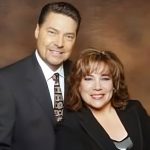 C&C Wealth Strategies is an income and wealth preservation firm that uses a systematic approach teamed with tax and legal advisors* to work toward customized results. Jim and Lorraine Conaway established Conaway & Conaway in 1996 to plan for better futures. C&C focuses on offering ROTH conversions, rollovers, pension maximization, income and portfolio analysis. Jim and Lorraine guide C&C by their moral obligations which suite to always put their clients’ financial lives in as the forefront of the business. Jim, Lorraine, the advisors, and the staff are continuously educating themselves on different ways to help clients work toward their financial goals. It is through a cognizant design of support and education where we establish lifelong relationships with clients and their families.
C&C Wealth Strategies is an income and wealth preservation firm that uses a systematic approach teamed with tax and legal advisors* to work toward customized results. Jim and Lorraine Conaway established Conaway & Conaway in 1996 to plan for better futures. C&C focuses on offering ROTH conversions, rollovers, pension maximization, income and portfolio analysis. Jim and Lorraine guide C&C by their moral obligations which suite to always put their clients’ financial lives in as the forefront of the business. Jim, Lorraine, the advisors, and the staff are continuously educating themselves on different ways to help clients work toward their financial goals. It is through a cognizant design of support and education where we establish lifelong relationships with clients and their families.
——————————————————
To listen to the EXTRA portion of this show go to RealEstateInvestingForWomenExtra.com
Learn how to create a consistent income stream by only working 5 hours a month the Blissful Investor Way.
Grab my FREE guide at http://www.BlissfulInvestor.com
Moneeka Sawyer is often described as one of the most blissful people you will ever meet. She has been investing in Real Estate for over 20 years, so has been through all the different cycles of the market. Still, she has turned $10,000 into over $5,000,000, working only 5-10 hours per MONTH with very little stress.
While building her multi-million dollar business, she has traveled to over 55 countries, dances every single day, supports causes that are important to her, and spends lots of time with her husband of over 20 years.
She is the international best-selling author of the multiple award-winning books “Choose Bliss: The Power and Practice of Joy and Contentment” and “Real Estate Investing for Women: Expert Conversations to Increase Wealth and Happiness the Blissful Way.”
Moneeka has been featured on stages including Carnegie Hall and Nasdaq, radio, podcasts such as Achieve Your Goals with Hal Elrod, and TV stations including ABC, CBS, FOX, and the CW, impacting over 150 million people.
Investment Strategies: Choosing Between A 30-Year Or 15-Year Fixed Mortgage With Jen Du Plessis – Real Estate Women

People always ask our guest Jen Du Plessis, whether to decide on a 30 year-fixed or a 15-year fixed mortgage. In this episode, she shares in-depth insights on what to choose and expect. She explains that the factors in your decision should always include analyzing the market opportunities and your life goals. There is no right way for everyone since people have different situations. Listen as Jen discusses the various factors affecting the rates of your investments, mortgages, and business. She also shares critical success strategies to help scale your real estate business. Tune in to know your assets and loans and make the right decisions.
—
Watch the episode here
Listen to the podcast here
Investment Strategies: Choosing Between A 30-Year Or 15-Year Fixed Mortgage With Jen Du Plessis
Real Estate Investing For Women
I am so excited to welcome back to the show, my friend, Jen Du Plessis. She is known as America’s lifestyle mastery mentor. People most attracted to her are high achieving professionals and entrepreneurs who are missing something. Through her mastermind, she helps people increase their awareness of what’s possible and to multiply the results in record time while having the courage to say yes to their personal lives.
She is the CEO and founder of numerous companies. She is from Northern Virginia and attended Colorado State University where she studied Architectural Design and Construction Engineering. She has been married to her high school sweetheart, has two children and three grandchildren. She has been in the financial services industry for many years and was listed in the Top 200 of Nationally Ranked Mortgage Originators and funded over $1 billion in mortgage loans. She is an eight-time #1 Amazon Best-selling Author, host of two top podcasts and a TV show host.
She is an expert in living a life of luxury, priority and time management, business relationships, business scaling, sales management and a certified mastermind facilitator. She is a charismatic speaker. She’s been sharing stages with icons such as Tony Robbins, Les Brown, Darren Hardy, Jeff Hoffman, Sharon Lechter, and many more. She believes that entrepreneurs can live their legacy while building it and it’s time to start living a life of luxury every single day.
—
Jen, welcome back to the show.
It’s so painful to listen to all that. Every time I get introduced, it’s what happens. You have to do it.
It’s so funny because we were in the green room chatting away and I was like, “I’ve got your bio.” She’s like, “No, I’m updated.” It’s so funny because I updated mine too.
We grow. That’s what happens. You have to add stuff.
That’s what we are doing. That’s what we’re supposed to do. We’re supposed to grow. I love that. Thank you. The last time you came on the show, we talked about mortgages and some of that stuff. I want to talk about specifically the 30-year versus the 15-year. I get questions on this all the time about, “Which one should I invest in because the rate is lower? Which one should I get when I do my refinance or purchase because one has a lower rate, but the other one has a lower payment?” I know what I say and my audience knows what I say, but I want to hear what you have to say about that because you’ve been in the industry about that.
When I was originating, I got asked that question all the time and it was funny because people don’t believe that you can customize a 30 or 15-year fixed-rate loan or 20, or 25. I used to have clients call me and say, “What’s your rate,” which is the wrong question to ask. I would say, “What have you been quoted on a 30-year?” They would tell me. I’d say, “Did they tell you about the Super Saver 25?” They’re like, “No.” “All that is a 25-year term. There’s nothing different, but you are a customizing.”
Even the difference between a 30 and a 25, if you look at how the loan pays off, you look on a graph, it’ll pay off sooner, not as much as a 15. There would be a smaller line, but depending on the person’s life goals or the goals that they have, that can be a good strategy for you. If you’re going to be in the house for a shorter period of time because, at any point in time, you have a lesser balance if you want to accelerate that.
The answer to your question is it depends. I used to reply it depends and bring them and go, “What do you think the answer is?” Everybody goes, “It depends.” There is no one strategy that’s good and I don’t think anyone should put their mindset to, “I only do 30-year. I only do-15.” Your life events, the market and the opportunity costs are all going to play a role in the decision that you make on it.
We wanted more return on our money and better ways to invest.
Before we move deeper because I do want to find out about this customizing, I was a mortgage broker for years. I didn’t know about that. I’m excited to hear more about that. The other question is, “What is the rate?” You said, “That’s the wrong question to ask.” What’s the right question to ask?
It’s interesting because the rate is an important factor and this gets down to the customization. I’ll take you back to The Great Recession that we had in 2008. At that time what gave them the momentum for that was that we had all been waiting for some market churn. At the churn of the century, we were all into the dot-coms and leveraging dot-coms and stuff because we wanted more return on our money and we wanted better ways to invest.
What ended up happening is because of dot-com, our eyes were opened and aware of what was happening in investing and in the marketplace and as consumers, all of us, we were hating to open up our 401(k)s every quarter and we’re like, “It’s going to be painful.” I don’t want to go too detailed but into the trenches of the secondary market and everything, loans are sold in pools. On conforming conventional loans or whatever that may be in your area, the standard cookie-cutter conventional loan, if more people are buying that, the pool is larger. It’s like taking all your groceries in at one time. It’s less energy versus 1, 1, 1.
If you have this big pool and you’re selling the big pool and you called the lender and said, “I want 30 or 45 days, 60-day lock.” We’re committing to delivering however many loans are in that pool by that date, otherwise, there are penalties. There’s one loan. It’s going to be more expensive to deliver than if there are 1,000 loans in that. The lender banks on the fact that they’re going to have a plethora of loans in a bigger pool and therefore, the cost of delivery is going to be lower.
You have to know this in order to understand. Back then what happened was, we said, “If you’ve got this big pool of clear water. You can drop one little drop of Coca-Cola in there or coffee and it wouldn’t impact the whole thing.” We as consumers said, “Let’s mix up our investing or mutual funds and stuff like that. Let’s mix them up a little bit and let’s drop even more of this color in.” What ended up happening is it turned color. It got bad because now we had more non-performing and difficult loans into these pools that we thought we would get good returns. We were all living high on the hub because we were like, “Look at this,” as it came in.
What people have to understand is that the rate is very important. I get it. I had been selling a negatively amortizing loan way back in the ’80s and ’90s for nine years. Best performing loan in the marketplace and lowest turnover because no one would refinance because the rate was always better than the market but we got all these brokers who came in and said, “I want that product to. I need to have a mix.” The start rate was one in a quarter.
They didn’t tell you about all the implications that it’s negatively amortizing. The best rate in the world could be a financial disaster. You don’t want to shop for a rate. You want to shop for the terms that fit your financial situation and your life events at that particular moment. It isn’t that there’s a better question. It’s not the only question. A lot of people lead with that and it’s important, but every lender is within an eighth and a quarter, sometimes 3/8 to each other. There are more than 365 lenders in the world and you’re never going to find the best rate every day because it’s all shifting around.
If you call at noon and the market tanks and you’ll call someone at 4:00, then they’re going to have a higher rate than the one you talked to, but when you call them back, they’re going to have the higher rate and vice versa. It’s not about the rate. It’s about who can deliver what your financial goals are or who can help you dissect the DNA. This is why you want to customize it. When I say customizing a 30, 15, 20, 25-year loan, it’s, “Do you want to put 5%, 3% or 0%?” There are different rate options. There are seventeen different things that can affect the interest rate. That’s the customization of interest rate.
When you call and go, “What’s your rate?” “My rate anywhere from 2% to 8%. What’s your deal? What are your terms?” As we talked about on the last show, I do a lot of situational lending. It’s called non-conforming. People will say, “Yeah, but the rates are high.” It’s not that high anymore. There’s not a big spread, but I go, “I understand that the rate is high, however, your situation isn’t fitting into the conforming. You need to understand that.” It’s not about the rate. It’s about who can get you across the finish line with the best terms for your financial situation at that moment.
I was also in the mortgage industry when the NegAms were the biggest thing. There were a lot of people that got killed by the NegAm or they thought they got killed by the NegAm, but the problem is it was because they weren’t educated. I love that you were like, “You need to understand the terms that my rate was 1.25%, but at that rate, it’s negatively amortizing.” Those NegAms all had a rate where you were not negatively amortized. They pay that. There were four options.
When you’re looking at that, all of my clients that did the NegAm, equity were going crazy here in the Bay Area. A NegAm made sense, but then as the market turned, they started to pay so that now they were paying their minimum in order to not NegAm so that they could wait for the properties to recover because we also took a huge dive as far as equity. Instead of getting called on those loans, they adjusted their payment. What happened with a lot of people is they ended up getting called on those loans because they didn’t understand that they could make a different payment.

Investment Strategies: There is no one strategy that’s good because your life events, market, opportunity costs are all going to play a role in the decision that you make on it.
That’s a consumer issue because we lack the financial education to understand how those work, but it’s more in the hands of the lender. You go to Bob and wherever Bob works and he manages your assets. It’s Bob’s job to call you and say, “That stock we were in, it’s going down.” We all experience this. We don’t get a call from Bob. We find out when we get our statement. “Why didn’t you call me, Bob?” The same thing happens with your CPA. They go, “You owe $30,000 in taxes.” You’re like, “If you had told me at month six to make some adjustments, I would have made adjustments.” This is a huge failure in the financial services industry and it includes lenders.
I don’t care if you’re in a 30-year fixed rate or if you’re on a NegAm loan, we need to be able to manage and help guide clients. That’s what I coach on for loan officers is having those mortgages under management. I used to say, “If you’ve been orphaned by your last lender, I’d like to adopt your loan.” They all left at the end of 2008. It’s dropping off like flies and these people were crying. They had negative equity and not because of NegAms loans, but because of other things. They didn’t know who to turn to. I said, “I’ll adopt your mortgage. I’ll be the Bob who helps you go through this.”
We had emotional refinances on 30-year fixed-rate loans, which is interesting because you had said, that adjustment, you could make the minimum payment, the interest-only, the 30-year and the 15-year payment. The people go for the low payment. It’s like your credit cards. Why do you go for the low payment? You know if pay more, it’ll pay off. If you don’t, you’re meeting the interest. That’s it and not even all of it.
If you do the minimum payment, it’s NegAm.
It’s the same exact thing. The only difference is it’s not on an appreciating asset. Be thankful that you have that on your mortgage. We did an emotional refinance on a 30-year fixed because people would say, “I’m not going to make any payments.” I go, “Hold on.” I had a guy call me once and he said, “For the last several years, I’ve been making an extra $100 payment on my mortgage.” He was not my client until I had this phone call.
He said, “All that adds up $1,200 a year times seven years.” Wouldn’t the lender give me that credit and allow me not to make the payment now, since I lost my job? “No. If you had put that $100 in the bank, you could draw from it and make your payment while you’re looking for a job, then you could refinance, but now you haven’t made your payment and you don’t have a job. I can’t help you.”
These are the discussions. It was so funny because I had a little bottle of pink Pepto-Bismol, a box of tissues, a bottle of wine, and I said, “Pick your poison because this is going to be a painful conversation.” If I could do an emotional refinance to help them strategize on how they’re going to get out of it if the market isn’t going to give it to them, that’s huge. On 30 and 15-year mortgages, it doesn’t matter. The customization is, “Do you want to put 5% or 20%? Do you know when you put 20% down, your rates are higher than if you put 19.99% down?”
I did not know that.
People don’t see it. They’re all going to put 20% down. I don’t want that private mortgage insurance. That would give you a lower interest rate. You have to ask these questions. You have to figure them out. One of my specialties was investors. With investors, people would come to me and say, “I want a 30-year fixed because I want the lowest payment.” They want cashflow. The problem is as investors, we’re doing the same thing.
When we make that transition from an owner-occupied homeowner to an investor, you have to take the emotion out of it. It’s about the numbers. When we go to a 30-year fixed-rate loan, while you may have the cashflow, you’re also not paying down the balance on your loan. We’re only looking at cashflow. We’re going to buy for cashflow or appreciation. It amazes me. I would tell people, I’d run these numbers all the time, “What if we did a fifteen-year and an investment?”
People are like, “I got my cashflow.” I remember running one of these negative cashflows. It was $275 a month. He said, “That’s not why I’m buying the property.” I said, “You’re buying the property for appreciation, so we’re going to go for negative cashflow.” “I can’t pay $275 negative cashflow on an appreciating asset that gives me a tax deduction, but I can pay $700 on a car.” While you have a job, this is a strategy. This is why I say it’s all customized. If you didn’t have a job and you were solely relying on that income, then we would put you in a 30-year, so you have the cashflow.
It’s not about the rate; it’s about who can deliver what your financial goals are.
While you have a job and you can afford $275 negative cashflow, let’s accelerate the payoff and let’s use these first two properties as jumping things to your next property. In that same five-year timeframe that you would own the house, one, when you’ll sell it and have had cashflow. The other, you will sell it and have more equity to take those two properties and go buy that one property and go buy two. Now, we’ll put you in the 30-year. That’s called step investing and people don’t see that.
It’s how Brian and I were able to exponentially increase our portfolios because we would take one, hold it, sell it and buy two. The next one we would buy normal and the next one we would buy fifteen-year term, hold it, sell it and buy two more. That’s why for the investor side of things, there’s a great difference between a 30, 15 or a 20, whatever you know is comfortable, but we jump into these crazy 30-year terms because we think it’s the safety, but we’re not going to have the loan that long anyway.
That’s true because most of us refinance.
That’s a NegAm loan. Every time you refinance, you rob yourself of equity because you roll the closing costs in. It’s not about the rate. It’s about the strategy you need to be looking for and how long you think you’re going to have the house and the loan.
What you guys do is you get a house, you take a fifteen-year loan, pay it down, you sell it and then with that equity now or whatever you get from that, you use that and you buy two. The next one you buy on a fifteen and those two, you finance on a 30 because you’re going to hold them longer. You buy another on a 30.
The two houses that I bought, one will be on a 30 and one would be on a 15. That fifteen, I will sell in five years and buy two more.
To explain what happens when you’re amortizing loans on a 30-year, in the first ten years, it’s basically all interest. You get this great write-off but you’re not paying down your principal at all.
You’re at 21 when the streams cross.
Those first ten years are all interests. When you’re in a fifteen-year, you’re paying down more principle, which is why her equity is growing. You’re paying it down. Your equity is growing because the property or asset is appreciating. You’re also paying down the principal. When do those lines cross on a fifteen?
It’s at year nine.
It’s a lot sooner. That’s why she’s doing it that way. She’s got one that she’s holding, one that she’s paying down so that she’s building equity so that she can buy another piece of property.
Instead of trying to save 20% down every single time for investors. At the time, I was doing 10% down for investors because that’s what you could do. That was to my benefit too, but again, this is why your lender is so important to you and why, “What’s your rate,” doesn’t work. Whether it’s owner-occupied and an investor that doesn’t work. You have to talk about the strategy.

Investment Strategies: It’s not about the rate; it’s about who can get you across the finish line with the best terms for your financial situation at that moment.
I call it the EHE strategy. “What’s your Entrance, Holding, and Exit strategy for everything?” We know as investors, we’re always going to have an entrance, holding and exit strategy, but we don’t think about that on owner-occupied. That’s important given what the long haul looks like. It’s not enough to find a good low rate.
You and I had talked about it too is the rate on a 15-year is lower than on a 30 because the investors can’t predict 30 years out. It might be a good loan. They don’t want those low-interest-rate loans on their books. Especially now, with inflation, everybody who refi’d in 2021, they don’t want those loans on their books. They want to get them out because they’re not making as much money as the inflation side. With new loans, they are, but you get a lower interest rate on a fifteen-year loan. More of your payment goes to the principal than to interest on a fifteen loan, so it pays off more. Less of the payment goes to interest on a 30-year loan.
If you’re going to commit to a fifteen-year loan, you’re committing to that loan. You and I talked about this in the green room. It’s better sometimes to get a 30-year loan and pay it as a fifteen anytime you want because no loans have prepayment penalties. You can pay at any time you want. Annually or monthly, it doesn’t matter. I would say, “Put your money someplace else and make lump-sum payments if that’s what you want,” because there’s no obligation to pay it.
What is your equity growing at? You can’t cut a piece of your drywall and walk into the bank and say, “I’d like some more of my equity back.” That doesn’t happen. I’d rather retain my equity in the form of cash in my bank account, but there are opportunity costs too. You’re paying more and accelerating the principal reduction for whatever reason you have. I would challenge people, “Why do you want to own your house free and clear? Is it because you don’t have any tax benefits?” Even in my house now, I have a little over $750,000 of equity sitting in my house and it’s killing me.
It’s because it’s dead money.
It’s sitting there and I hate it because we were going to move, but my husband had a medical thing and now we can’t. We got to sit here, but it drives me crazy. There’s no benefit whatsoever to having all that equity in there, but you could reduce the equity if the interest is lower. If you took a 30-year fixed rate and the interest is higher, you have a lesser payment, you could divert that money that you would have paid on the fifteen to something else.
You could divert it to paying off debt, non-preferred high-interest rate debt that’s not tax-deductible. You could divert it to funding your child’s student loans or education. You could do what you and I do. We get capital and then we seek around and try to find another place to invest our money. That’s opportunity costs. If you get a fifteen-year loan, because you want equity, you’re missing out on opportunities to be able to create other cashflows passive income.
Think about the Delta about that. What right now is the rate of a fifteen-year?
I don’t know what the rate of a fifteen-year because I’m not in the market anymore, but I’d say it’s probably 3.25% or something like that.
Your Delta is 3.25%. You’re paying 3.25% more so you have cash available to you so you can make another investment.
To get a 30% return.
As investors, we’re always going to have an entrance folding and exit strategy.
Even if you get an 8% return, is it worth it to you to use that cash to make 4%, 5%, 10%, 50%, 30% or whatever? It gives you the flexibility that we went through COVID. How many people were like, “I can’t afford my mortgage.” If you’re on a fifteen-year and your payment is higher, you have to pay that higher payment. If you’ve got a lower payment because you’ve got a 30-year, you only pay that 30-year payment. When times are flushed, you’re welcome to pay down that 30-year if you want to.
You can put it in a bank or invest it over.
That’s why I recommend always to get a 30-year because it gives you so much more cash flexibility because I’ve seen 2001, 2008, 2019, 2020 and 2021 come. We’ve suffered financially and it’s a bit of a security blanket not for rate, but for payment.
It’s always about the payment. What we were talking about in the green room is there are life events that happen to all of us. During COVID, people got divorced, passed away, or got married. There are life events that depict whether you should be doing a 30 or 15. Whether you should pay points or not. whether you should roll in your closing costs or not or you should escrow or not. All of those seventeen different factors have to be looked at every single time and not because they need to be looked at to get you the lowest rate. You want the lowest rate, I get that. I want it to, but the lowest rate for your terms for the things that you want.
For example, people don’t realize that it costs extra money at closing to waive escrows. People don’t understand that. The reason you don’t understand that is because if you don’t pay your taxes on your own, you don’t pay them. They become the first position and the lender could lose the entire principal balance of your mortgage if you don’t pay your taxes and it gets turned over to someone like me who buys tax liens. I’ll buy a tax lien for $5,000 and I get a $300,000, $400,000 house free and clear because the first mortgage is beneath that. It’s more of a risk on the lender side that you’re going to be capable of striking that check in a timely fashion to not hurt their equity or collateral.
That’s why they want to EMP out.
All of this depicts what your circumstances are. Don’t lead with rate, get the whole gamut.
Go to somebody who understands. This is why we talk about this all the time. When you’re going to a lender, you want someone who understands investing because the conversation is different for investing than it is for a primary residence. It’s significantly different because the package is different. The goals are different. How long are you going to hold that loan is different? There are a lot of different things. Those are the basic things and things we don’t even know to ask or we do know to ask, but there’s a lot that we don’t know what to ask. Your lender will help you through that.
Even if it’s owner-occupied, you need to be taking this strategy and this outlook. You don’t want order takers. You don’t want to call Quicken Loans because they’re not going to do anything to help you. They’re order takers and are there to give you the lowest rate. If you go on Quicken or Rocket Pro go and immediately, they’re on you like, “Do you want to talk?”
You see a great rate. If you scroll all the way down, you’ll find out that you have to put 25% down and it costs three points to get it. If you have a $100,000 loan, that’s $3,000. If you have a $300,000 loan, that’s $9,000 to buy that rate, which may be your strategy, but most people don’t have 25% down and three points on an owner-occupied.
Could you tell me a little bit about doing a 20-year or 25-year loan? I know that they’re out there. I don’t know how to get them and I was a mortgage broker.

Investment Strategies: It’s not about the rate. It’s about the strategy you need to be looking for and how long you think you’re going to have the house and the loan.
All you have to do is ask because there’s pricing available for 20, 25, and 30-year loans. Fifteen and below is going to be one price or the same price. Anything above that is going to fit into the category of a 30-year fixed-rate loan and there might be a slight advantage. It’s a little yin and yang that goes on because like a 30-year with 20% down would be X price. A 25 would probably be the same price, but if you put another five down, you might get a better price and then it depends on the day or market.
All of this adjust moment by moment, all day long as stocks are trading. This is exactly what is happening with the market. If you have a phone call with someone at 10:00 in the morning, that’s yesterday’s rate. If you have a call with someone at 11:30 or 12:00, that’s this day’s rates as they were released and good luck the rest of the day because they could be adjusting all day long. This is why you’re never going to find the best rate in the market. You’re going to have to find what works for you.
We were talking about you sell the loans in buckets to Fannie and Freddie or whatever. When you’re trying to get a specialized or customized loan at 25 or 20 years, doesn’t that take it out of the bucket?
No, it’s still sold in the 30-year pool. It’s still the same strategy.
It’s amortized differently.
What makes it different is that it’s the loan amounts. It is not the points you paid or whatever. They’re sold based on the loan amounts. This is interesting because it’s a question that I ask the loan officers and realtors all the time and you wouldn’t believe how many can’t answer the question. This is scary. As consumers, you want to be able to answer it. “Why is the interest rate higher on a $1 million loan than it is on a $400,000 loan?” What do you think the answer is? We’ll put you on the spot. Not because you were a lender or anything. This is what consumers do is risk and it’s not. That is not the right answer.
For example, a $400,000 loan has someone who’s putting 5% down is squeaking by with credit, is squeaking by with qualifying ratios. It is getting a gift. He probably has some job changing and hopping. He has high debt. We’re using all their money. Maybe they’re even getting a 401(k) or all of that. That’s less risky than someone who puts down 35% on a $1.2 million home.
My husband and I have this conversation all the time. We can afford a $1 million loan. Why are we getting hassled when someone who can’t afford the $200,000 loan is not? I get what you’re talking about.
The reason is the pool. There are fewer people buying that high of things. The pool is always smaller. The price across the sale of the pool is higher. It’s not a risk at all.
That’s so fascinating. Thank you for that. I love that. Now, we know.
That’s why when you go to a bank and they have a portfolio loan, they have something that says, “We can do something unique and different as a portfolio.” It’s a higher price because it’s not even sold in a pool. They’re taking on the risk on its whole. They’re shelving the loan and they’re not selling it. That’s why when we get to situational lending, this non-QM or non-qualified mortgage, non-standard Fannie, Freddie, FHA and VA. We start getting into non-QM, the rates are a little bit higher because you’re asking them to take on a riskier situation.
Every day is a choice. You can choose to be successful.
A situation where they can’t sell it in the secondary market or now, we can. We can sell in the secondary market, but again, the pools are smaller because fewer people are coming into that. I call it situational lending, which is the name of my mortgage company, Situational Lending because your situation depicts what the price is.
Tell everybody how they can reach you.
The best way is you can go to JenDuPlessis.com and send me a message or something and I’ll be happy to respond to you. You can text Make Your Mark to 26786 so you can get some preliminary information about what I’m doing. I hold very high-end masterminds that are for people who are highly successful and are missing something in their lives. What I’m here to do is guide you in that facet, mortgages and on business. I don’t coach anybody. It’s a mastermind. We have some personal breakthroughs too. It includes a high-end retreat. I believe that mindset plus mechanics creates momentum. You can’t have one and create momentum. You have to have both.
You can text 26786. The thing you’re going to text is Make Your Mark. It will go through even though it’s not a normal phone number. It’s all set up that way. What are we going to be talking about in EXTRA? We’re going to be talking about priority management. This is one of the things that Jen does better than anybody else. She runs all these companies.
She still has time for vacations, spend time with her husband and her grandkids, and all the things that she loves to do, but she also runs all these businesses. She does a good job of priority management. I want her to share some of her magic and wisdom around that. We’re going to do that in EXTRA, so stay tuned for that. Before we move into EXTRA, here are three rapid-fire questions. Tell us one super tip on getting started investing in real estate.
Get educated. Go talk to several lenders and find out who has, what specialty, where, everybody has a niche and expertise. Make sure that you go to the person who has. Don’t go to your buddy, grandma, sister or grandchild. Go and talk about what their expertise is in any type of investing.
What is one strategy for being a successful real estate investor?
Sometimes we assume things. We get contracts in and we go, “I’ve seen that contract.” Don’t. Look deep into those. I would say that strategy is to get yourself comfortable with looking at contracts and looking at terms, etc. Ask some title companies or escrow companies around you if you could look at investor contracts. They can mark out all the people and all that good stuff just so you get a feel of what it looks like because that first one that comes in is scary.
You feel so much more confident making offers and doing deals if you’ve got some depth of knowledge inside of you that you can count on. It gives you more confidence.
Even with me when dealing with our Buyers Club, the first time I got the contract in I was like, “This is foreign to me.” I’m not going to make assumptions that they know what they’re doing so I’m going to challenge everything on there to make sure that I clearly understand.

Investment Strategies: Get yourself comfortable with looking at contracts and looking at terms. Ask some title companies around you.
What would you say is one daily practice that you do that contributes to your personal success?
For lack of a better word, get your head on straight. Get a checkup from the neck up every morning. Meditation, prayer and all those good habits that you have in the morning. Every day is a choice. You can choose to be successful or you can choose to let the day slip by. I choose to be successful and the only way to do that is to reformat myself every day. Recalibrate every single day.
This has been phenomenal. Thank you so much for everything you’ve offered on the show, Jen.
Thank you so much. I sure appreciate it. I always love talking to you, Moneeka.
Thank you for joining Jen and I for this portion of the show. We do have more so stay tuned for EXTRA. We’re going to be talking about priority management. If you would like to subscribe to EXTRA, go to RealEstateInvestingForWomenEXTRA.com. The first seven days are for free. Go check it out. For those of you that are leaving Jen and I now, thank you so much for joining us. I appreciate you. I look forward to seeing you next time and until then remember, goals without action are dreams. Get out there, take action and create a life your heart deeply desires.
About Jen Du Plessis

Jen Du Plessis, America’s Mortgage Mastery Mentor helps mortgage loan officers and real estate agents who are overwhelmed, stressed out, and sabotaging their personal lives for the sake of their business to multiply results in record time and have the courage to say yes to their personal lives (which sometimes means saying no to clients).
During fifteen of her 37-year career in the mortgage industry, Jen has been listed in the top 1% of loan officers nationwide; spending 3 years in the top 200 of nationally ranked originators, and has funded over $1 Billion in mortgage loans. She is recognized as an Influencer in her industry as the best-selling author of LAUNCH-How to Take Your Business to New Heights, top podcast host of Mortgage Lending Mastery, and highly sought out and charismatic speaker; speaking on stages with such icons as Darren Hardy, Tony Robbins, and Les Brown.
Today Jen is passionate about empowering mortgage loan officers to achieve professional and personal breakthroughs so that they stop the daily chaos by identifying their priorities to gain calm to take back control of their business and life. She is guiding her coaching students to attract clients rather than chasing them. And lastly, she is devoted to helping each student’s business grow exponentially rather than hitting the reset button to have the same results year-after-year.
She has been seen and heard on Good Morning America, Sirius/XM Radio, Voice America, and Mortgage News Network. Jen has been featured in publications such as The Wall Street Journal and The Washington Post; is a regular contributor to Mortgage Executive Magazine and Mortgage Women Magazine and has been recognized with the Women with Vision Award as one of the Top Women in the Mortgage Industry.
______________________________________
To listen to the EXTRA portion of this show go to RealEstateInvestingForWomenExtra.com
To see this program in video:
Search on Roku for Real Estate Investing 4 Women or go to this link: https://blissfulinvestor.com/biroku
On YouTube go to Real Estate Investing for Women
Moneeka Sawyer is often described as one of the most blissful people you will ever meet. She has been investing in Real Estate for over 20 years, so has been through all the different cycles of the market. Still, she has turned $10,000 into over $5,000,000, working only 5-10 hours per MONTH with very little stress.
While building her multi-million dollar business, she has traveled to over 55 countries, dances every single day, supports causes that are important to her, and spends lots of time with her husband of over 20 years.
She is the international best-selling author of the multiple award-winning books “Choose Bliss: The Power and Practice of Joy and Contentment” and “Real Estate Investing for Women: Expert Conversations to Increase Wealth and Happiness the Blissful Way.”
Moneeka has been featured on stages including Carnegie Hall and Nasdaq, radio, podcasts such as Achieve Your Goals with Hal Elrod, and TV stations including ABC, CBS, FOX, and the CW, impacting over 150 million people.
What Common Mistake Do Many Real Estate Investors Make? With Zack Boothe – Real Estate For Women
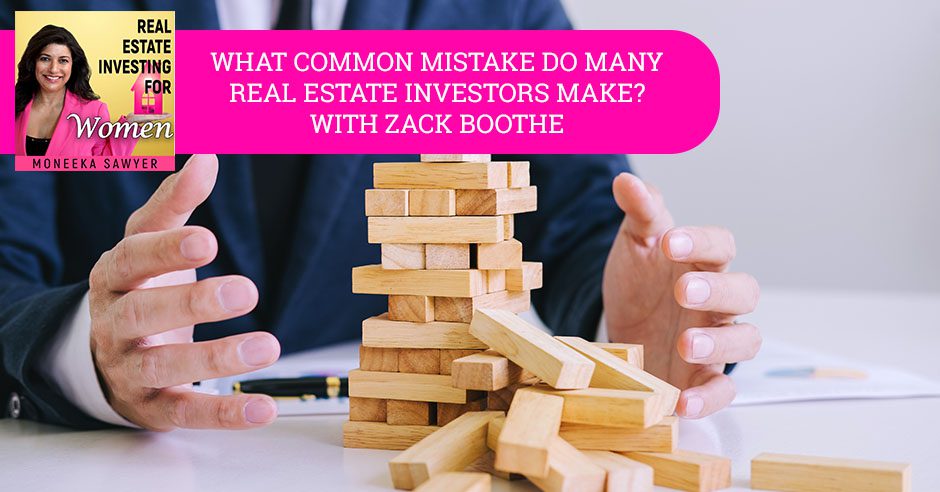
What is the most common mistake beginners in real estate make? They try to figure things out on their own. Moneeka Sawyer’s guest today is Zack Boothe, the founder of Driving For Dollars Mastery. Zack shares with Moneeka how listening to podcasts and watching YouTube videos won’t give you a clear path as coaching can. Find a mentor you connect with to help you find a path that works for you. It’s only when you have massive belief in what you’re doing that you succeed. Tune in and learn how to find the right mentor for you!
—
Watch the episode here
Listen to the podcast here
What Common Mistake Do Many Real Estate Investors Make? With Zack Boothe – Real Estate For Women
Real Estate Investing For Women
I am so excited to welcome to the show Zack Boothe. A few years ago, Zack was a window cleaner. You can even find his window cleaning tutorial videos on YouTube with millions of views. However, Zack always dreamt of being a real estate investor. Taking a leap of faith, he walked away from window cleaning. With a handful of years, he was making over $1 million per year from real estate investing. With his successful business, he now spends his time helping others see how simple it is to make money with real estate. Zack is here to share his insider secrets to finding massively discounted properties, regardless of your experience level. Zack, welcome to the show.
Thanks for having me. It’s good to be here.
I’m so glad that you’re able to make it. He told me before, Ladies, that he wasn’t feeling very well. I thought that this conversation was interesting. I didn’t want to put it off. We’re going to go ahead and go for it, Zack. I’m excited to have you here. Tell us a little bit more about your story, like the high-level two-minute version.
I was a window cleaner. It was good. I was providing for my family, but it wasn’t quite enough. It was a struggle. I wanted something different. I wanted to be able to provide a better life for my family. The day my son was born, I couldn’t help but be overwhelmed and stressed about how I was going to pay the medical bills. That pushed me to want to get into real estate investing. I did my first investment deal back in 2012. I bought a rental. It was a pre-foreclosure. My wife and I got dirty and cleaned it up ourselves and rented one side and lived in the other.
We had that experience and got the bug. We wanted to do more deals. We have so many roadblocks after that. Debt to income ratios, getting the loans, being self-employed, especially because I wasn’t making a lot of money as a window cleaner. I found out about real estate wholesaling. I got a mentor and it’s changed my life. Now I’m making six figures a month from this business. I have a team that does it for me. I do it in two different markets. I coach other people to do this, which is my passion and what I love doing. I create content. I have a podcast and YouTube channel around it. I love it. That’s the two-minute version of my journey and where I’m at.
Zack, how much time per week would you say that you spend on your business?

Real Estate Common Mistake: The biggest mistake people make is they try to figure things out on their own.
In coaching business, a lot. That’s where I spend all my time. If it’s a workweek and I work all week, 6, 7 days a week, it’s all day every day. As far as the wholesaling and investment business, I maybe spend four hours a week. I’ve been picking up about one property that I’m keeping for myself. I consider that my holding company. I’m spending a couple of hours a week on that business as well, but the wholesaling business that’s generating the majority of my money, I spend very little time at this point.
I look at what I do and people might be like, “That’s not true.” It is true, but where I spend my time is every Monday, I have a team meeting. I sit in on the Monday meeting. On Wednesdays, we do KPI reviews. What is that? I sit down with my two main people in my company, my marketing director and my lead acquisition manager. We sit down and look at our numbers. What our business did and where we’re at? Another thing, I’m going to lunch with a potential financial private money lender. Those are the kinds of things that I do. I meet with high-level people. I interview someone that’s going to be a project manager for a flip or whatever that might be, but I don’t spend much time in the business.
How long did it take you to get to this point where you’re only working about 4 to 6 hours a week?
I quit window cleaning and went full-time into real estate investing at the beginning of 2017. It’s not long. A few years ago, I transitioned out of the day-to-day. It took me about two years to build the company. The first year we did $118,000 in income. The second year, I did shy of $500,000. The next year we did $1.2 million, and that’s what I walked away from the business and put other people in place.
The cool thing is I cut a lot of expenses but also cut revenue and had some hiccups doing that. The next year, we only did $700,000, but my profit margins were better. In May 2021, we’re at $700,000 already. We’re fully expecting to have our best year ever because I increased our ad spend by 25%. We should end 2021 between $1.5 million and $2 million in sales with a 40% profit margin.
Ladies, this is why I’m having this conversation. The conversations that I’m most interested in, and I know so many of you ladies are interested in, is you’re successful, and this is what you’re doing right now, but how did you get here? I only worked 5 to 10 hours a month, and people were like, “Was it always this way?” No, there’s a ramp-up time. When you start your business, what is it that you’re doing to make that happen? For me, I’ve always worked those hours, but my business was a side hustle. I wasn’t paying attention to it.
I’ll admit openly that I probably would have reached wealth much faster if I had paid more attention. I loved this conversation with other successful real estate entrepreneurs to find out what the ramp-up looks like and where they’re at. That’s why I wanted to ask these questions, Zack. One of the pieces that I wanted to ask you is, in the first three years, how much time do you feel like you were spending in that business? Was it part-time, partial time, more than part-time? What did that look like?
It’s overtime hours. I still work more hours than most people, but I believe that this life is not made for sipping piña coladas on a beach. I believe that we find fulfillment in life by challenging ourselves and growing. Once I started finding success in real estate, I happened upon coaching. It wasn’t even planned. I started finding fulfillment helping other people find success. My mentor said something that stuck with me. He said, “When you win in the game of money, there’s no joy in running up the score.”
We find fulfillment in life by challenging ourselves and growing. Share on XPeople say all the time, as wealthy people, even though, “Money’s not important.” Someone hears that, and they go, “Yeah, because you already have money,” but they’re both right. There’s a certain amount of money that is very important. You’ve got to provide for your family. You’ve got to eat. There is a certain level of money once you hit that. More doesn’t equal that same level of comfort and peace. I started having a massive amount of financial success after hustling for two years, and I wanted something different.
I’m going off on a tangent here to answer your question. I worked very hard in my wholesaling business in those first two years. I walked away from my window cleaning business. I had two months until I was not going to be able to pay the mortgage. I hadn’t done a wholesale deal. I hired a mentor and I was going to do it. I know it’s a little crazy for most people. I had to put my coaching fees on a credit card. A lot of my marketing is on a credit card. I was going to make it happen.
I was working until 10:00, 11:00 every single night, seven days a week, until I did my first deal. I did my first deal. It was $10,000 and it was amazing. My biggest deal that first eight months was $30,000. That was the $100,000 that I made in that first year, the first eight months of wholesaling. I kept working my butt off. My mentor also said something that stuck with me. He said, “Hustle is a season, not a way of life.”
I feel like I hustled to work hard, but then it got to the point where I started working a little more strategically to build out the team. To get to that level of success, you have to start somewhere. Where do you start? Your goal is to get your first deal, your second deal, and then your third deal. It evolves from there. Don’t overcomplicate it. Don’t look at someone that’s had levels of success and has a team and says, “I only work five hours a week.” I was like, “How’s that possible?” They work their butts off in the beginning.
You and I have a little bit of a different point of view, but I love that each of us has how we define bliss and then that’s what we work for in our life. That’s what gives us fulfillment. Could you tell us the mistake that you see beginners make in real estate investing, the biggest mistake, the most common one?
The biggest mistake that people make is they try and figure it out on their own. They listened to a podcast. They watch a YouTube video and then they watch another podcast. They take some action steps, but it’s unorganized. It’s not clear. They don’t know exactly if it’s going to work. When they’re doing those action steps, they’re not super confident in them. One of the guys that I follow that I love, Tony Robbins. He talks about the cycle of success that people have.
To be able to tap into our full potential as people, we have to have a massive belief in whatever we’re doing. If we start wanting to do a wholesale deal and we watch a YouTube video and be like, “They said to go buy a list from PropStream and to send postcards. I’m going to try that.” You go do it. You’re not sure if it’s going to work. You’re not going to give a massive amount of effort. For example, you’re not going to drop $7,000 on postcards. You don’t have a massive belief.
If you know for a fact that if you spent $5,000 to $7,000 on postcards, you’re going to make $30,000. Would you do it? Yes, because you have a massive belief in it. What happens is if you have a belief, you’ll give massive action. If you give massive action, you’ll have massive results. You’re going to build your confidence. If you’re going to do another deal and another deal, and you’re going to grow, do more deals and add more marketing strategies or whatever that might be.
The problem is people don’t go at it with confidence because they’re going at it alone. They’re trying to figure it out from just a podcast. That’s why it was so important to get a mentor. That’s why I got a mentor in the beginning. I would not be successful without my mentor. Tom Krol was my mentor. He doesn’t coach anymore. I love him to death. He changed my life, got me out of window cleaning and into this business.

Real Estate Common Mistake: Driving for dollars is a simple strategy to find discounted properties.
He’s out of Florida, but he gave me the action steps. There was no confusion of like, “What do I do next? If I do this, will it perform?” He said, “Zack, go do this and this.” I went and did it. I’m like, “Done, now what?” He said, “Do this and this.” I went and did it. I did it in mass. I took very uncomfortable steps, but he told me to do them. I knew that he was successful.
If I did what he did, I’d be successful. That’s how I had success. I feel like that’s the number one issue. People put a toe in instead of jumping in, but the problem is they don’t get a mentor. That’s jumping in. It was like getting a mentor that gives them the step-by-step action steps so they can implement them and do them. I also believe there are bad mentors.
I do, too. Yes, thank you for addressing that.
I’m not going to pay anybody, but I believe getting a mentor that’s going to get you there is very important.
How do you pick a mentor? What would you recommend?
There’s a handful of things that I would suggest. Some people might be hearing this and going, “You’re saying that because you are a mentor,” yes, but I’m not going to coach everyone that wants a coach. Find your mentor, first of all, that you connect with. Someone might have already heard some of the things I said and completely don’t vibe with me. First of all, don’t even think about working with me. Find someone that’s a mentor that you vibe with.
The type of person that you have, and also are living the types of lives, have the same core values, same core beliefs. They’re your port people. They would be your best friend in different circumstances. That’s the first thing I would look at. The second is that they are doing what you’re trying to accomplish. Don’t hire mentors that only teach but don’t do what they say. If you want to get into wholesaling, make sure they also wholesale and coach, not just coach.
Hustle is a season, not a way of life. Share on XThe next thing I would look at is do they have successful students. It’s one thing to say, “Yeah, I know how to do it.” It’s a whole another thing. I promise. Coaching and doing wholesaling are two different things. If that coach hasn’t been able to help lots of people become successful and you can’t talk to those successful students and have those successful students say, “Yes, that person changed my life.” Just like I talked about Tom Krol. If their students aren’t saying those kinds of things, don’t join the program. That would be my advice, those three things.
Thank you for that. I do get a lot of people who call me and they’re like, “Moneeka, you talk about getting a mentor. How should I get a mentor?” That’s great advice. Thank you for that. What would you say is the best strategy for finding deeply discounted properties? That’s what you do?
That’s what all of the real estate investing is. It’s finding discounted properties. I was reading a book called Multi-Family Millions, but it’s talking about doing giant multifamily deals, million-dollar projects. He said something that clicked. This was at the beginning of my real estate journey. He said that, “Real estate investing is marketing. Our product is real estate. If you can’t get that between your two ears, you won’t be in business for long.”
He has a couple of sections in there. We talked about how you find discounted properties. It doesn’t matter if you’re wholesaling or giant properties. Our business is marketing. We have to find discounted properties to do deals on. There’s the cliche saying, “You’ve got to buy low to sell high.” You have to start with a good deal. It doesn’t matter if you want a wholesale, buy and hold, flip, syndications, whatever it might be.
One of the things that I do and everything that I do is branded Driving For Dollars Mastery or DFD Mastery. My website is DrivingForDollarsMastery.com. Driving For Dollars is a strategy that I use to find discounted properties. It’s simple. You drive around neighborhoods and find the ugly properties, the ugly multifamily houses and single-family houses. You add it to a list. You find out who owns it, and then you see if they want to sell. That’s simple.
Obviously, there are things to be more efficient to do on a larger scale and to be able to be very profitable. I truly believe that is the best way to find off-market discounted properties. There are lots of ways, though. There are banded signs, radio, online marketing. There are lots of different things, but I truly believe that is by far the best, most profitable, and fastest way to deals.
Zack, where are you located?
I’m in Utah.
It’s a hot market there, too. It’s a hot market everywhere.
It is everywhere. I also live in Tampa. I do it in two different markets.
Talk to me a little bit about how you do this in a hot market. I live in San Jose, California. If someone wants to sell, if you send them a letter and you say, “Do you want to sell?” They’re very aware of what their property would be worth if they put it on the market, even if it was as-is. It’s hard in this area to get a discounted property because people can put it on, and bids will come in. Everything’s going for multiple offers. Things are going for several hundred thousand dollars over asking. Finding a discounted property is difficult in my experience. What would you say to that? What do you recommend?
It’s very important to understand that you have to be a deal finder, not necessarily a deal creator. Many people think that you have to be this swindler or dishonest, or shady to get discounted properties because everyone knows or understands that it’s a hot market and they can get a lot. What you need to understand is some people want convenience over the price. For example, we are real estate investors, wholesalers. We’re pawnshops for houses.
That’s the best explanation I can give. For example, if someone takes a piece of jewelry out of their house and they go, “I don’t want this piece of jewelry anymore. I want cash.” They could list it online. Put it on KSL, Craigslist, whatever online resources, eBay, and try and get as much as possible. You could drive down to the corner store and say, “Here’s my ring. Give me cash.” You’re going to make less at the pawnshop, but there’s a convenience factor, pawn shops to make money.
There are only a select few people that want to sell stuff at a pawnshop. There are people that and you might think that doesn’t exist, especially in a hot market. That’s not true at all. It’s not true because I’ve made $700,000 in five months doing this. It works. The funny thing is I have the same conversation with my neighbor, my cousin that calls me and says, “I need to sell my house. Will you buy it?” I say, “You might make more money listing it with an agent. Why don’t you do that?”
“I’m an investor. I can have it done quickly, but I might not be able to be your best offer.” They say, “Yeah, I’m not in a hurry. I’ll probably list it and fix it up myself.” It’s like, “Okay, best of luck. I can’t help you.” They say, “Yeah, I don’t necessarily care about getting out the money. I don’t want to fix it up. I don’t want to deal with an agent. I want to be done.” When they say that, that means it’s a deal. They want a pawnshop for a house. The biggest thing is you put out a net to the ugly houses in your neighborhood and ask them if they want to sell. You have that exact conversation.
Why don’t you listen, it sounds like it’s a decent property? It might need a little work. Why don’t you fix it up and list it? If they tell you, “No, I don’t want to,” then it’s a deal. I’ve captured those conversations. They’re on my YouTube channel. I straight up say, “You will make more money, listing it with an agent. Why don’t you do that?” They say, “I don’t care. I want it gone.” That’s who we’re trying to find. Are there very few people that want to sell their houses for speed and convenience? Yes. That’s why it’s so important to do marketing and to have a strategy to find off-market discounted properties.
Zack, I’ve never heard that analogy. Thank you.
You’re welcome. I stole that from Tom Krol as well. I’m not lying when I say, “Get a mentor. He changed my life.” I’m changing people’s lives by helping them. It’s going to snowball. There are going to be 2 or 3 people that I changed their life. They’re going to change more people’s lives. That’s fulfillment to me. I can go to the grave with all this money. It’s not going to make a difference, but what will make a difference is this content that we leave behind, the YouTube videos, the things that we talk about, the people that we helped. I will always have nothing but love and respect for Tom because of the action steps and the things that he did for me and the things that he gave me. I want to pass that on.
You talk a little bit about having different exit strategies. This is a hot topic for me that I talk about quite a lot. Could you talk a little bit about how you decide on your exit strategies to make the most money when you get a property?

Real Estate Common Mistake: Wholesaling is amazing because there’s no getting stuck with the deal.
When I first started, everything was wholesaling. I find a deal and a buyer that wanted to buy my contract and close on it. I didn’t have the money. I didn’t have the ability to do anything else. I was broke. I didn’t have debt to income. I didn’t have credit. I didn’t have private money investors. I didn’t have all those relationships I do now. What I do is we put together the deal. I don’t sign any of the contracts anymore, but the deals are presented to me. We’ll blast an email out to all of our cash buyers. We do a full inspection on the property.
Our agent goes to the real estate inspection. Our project manager goes to the inspection and all of our cash buyers. We get all of our cash offers in. We take the highest and best is what we tell our cash buyers. There’s no telling what our offers are and those kinds of things. I just want to get offers in. I don’t want to play the game of, “Tell me where I need to be. People are waiting to give me offers because they want to be last,” all that garbage.
I can assign it and say, “I’m going to sign a deal for $30,000. I can assign it for $30,000, or I can close on it with my cash. Keep it as a rental and refinance myself out or hard money and refinance myself out.” I evaluated it as a rental. I also have my project manager rough give me the numbers and present the Excel spreadsheet where we’ll be if we flipped it.
That’s why I have my agent there. What we could sell it for fixed up, what needs to be done as far as remodeled to get it there. The bids put together for that. I get to choose, “Do I keep it as a rental? Do I flip it? Do I wholesale it? Do I close on it and list it?” I have whatever strategy that I want to approach. During the acquisitions portion, we’re also talking to the seller. See if seller finance is taking over the mortgage is an option or if the cash offer is all they want. Depending on what they get it under contract for, then we’ll evaluate the deal from there.
I usually have three exit strategies, so it’s nice to see that you’ve got four. Ladies, this is an important thing to keep in mind. Zack, in the beginning, had to do it one way. Even me, I started in construction. This is the worst time on the planet to be in construction. Even when I got in, I had three exit strategies planned out. It wasn’t like I have to build this thing and sell it, or I’m going to die or go bankrupt or lose everything.
Even in the beginning, for me, if I get stuck with something, I know what I’m going to do with that. When you’re starting, even if it’s a wholesale thing, you had to make money. If you did end up getting stuck with a property, you would have a strategy to get out of that. Think through when you’re putting together your strategies, what could plan B be if things go bad? Wouldn’t you agree with me on that?
Find the mentor you connect with. Share on XYes. I also believe that’s the power of wholesaling. Why wholesaling is so amazing is there no risk. There is no getting stuck with the deal. That’s why I started with wholesaling because I saw it as a way to build a rental portfolio. I saw it as a way to build well because not only could I start my marketing and start finding off-market discounted deals there, step one, write good deals, but then I could get cash for them and not have to take any risk. As I built up more cash, then I can take that cash and maybe flip one and make a little bit more on the deal than just assigning it. The thing is, my average assignment deal in Utah is $30,000. In Florida, that’s $18,000 a deal. My profit margins are 40%.
That’s a lot of money. It’s a chunk of change. Eventually, getting into holding properties or flipping and taking those risks and having those other strategies is great. There’s nothing wrong with starting off at first with having wholesaling because if you do it right, we’ll have it under contract. In your contract, you’ll have a timeframe to inspect the property and to try and find a buyer for your purchase contract. If you can’t find a buyer within that time, you can cancel that agreement. You don’t put properties under contract. You don’t think that you can find a buyer for it. That’s the beauty of wholesaling. It’s a great place to start, and it’s way less risk-taking debt to flip a house.
Thank you for all that. Zack, tell everybody how they can reach you.
The best place to find me is my website, it’s DFDMastery.com. DFD stands for Driving For Dollars.
I know you don’t have a specific gift for people. I know that you’ve got a lot of content that you wanted to share with my audience. Tell us a little bit more about that.
I worked hard to help and to give back the content I create. I went down to Florida and the goal was to take $1,000 in a whole new market and turn it into $40,000 in 40 days. I opened up Florida. I’ve said, “I do deals in Florida. This is how it all started.” I flew to Florida. I had 40 days to make $40,000. I documented it all and had a film crew there and shared it for free on my YouTube channel. You guys can go see what it takes to get started in wholesaling with a very small budget and to see what kind of work that includes. You see the ups and downs.
I share the deals that fall apart. I share the frustrations, the exhaustion because it’s every day I share an episode. You get to see the entire process. It’s totally worth watching. We ended up with seven contracts. Two of them fell apart. We closed on the other five. Two of them, I kept as rentals with $100,000 in equity in both of them. Three of them, I ended up wholesaling. I sold the purchase contract. We made $93,000 on those three deals. Since I did everything myself, that’s pretty much all profits. It was a chunk of change. I don’t know very many people that could make $100,000 in a month. It’s not because they’re not smart enough or don’t have the work ethic.
They don’t know how. The whole point of that challenge is not to show off or anything, but it’s to show you guys that you guys can do it. I don’t feel like I’m anything special. I was a window cleaner. I didn’t go to college. I didn’t come from money. I had a good work ethic. You should see my spelling, it’s bad. I’m saying that I did that whole challenge to encourage you guys and to show you what’s possible. I don’t want to sugarcoat any of it, it’s hard. It’s a lot of hard work. The process is simple, but it’s not easy. That was the whole point of the challenge to show what it took to be a wholesaler and how to get started and what that initial hustle looks like.
Zack, that’s so generous that you did that. How do people find it on YouTube? What should they be looking for?
If you go to YouTube and search DFD Mastery. My YouTube channel is DFD Mastery. Everything I have is branded DFD Mastery, which stands for Driving For Dollars Mastery. You can find my YouTube channel. There’s a ton of awesome content in there. I’ve been producing three videos a week. We’re going to bump it up to four episodes a week. It’s a lot.
Ladies, go check that out. Thank you for that. Are you ready for the three Rapid-fire questions? Tell us one super tip on getting started investing in real estate.
Get a mentor, find a mentor.

Real Estate Common Mistake: The whole point of the challenge is not to show off but to show you guys that you can do it.
What’s the strategy for being successful in real estate investing?
I believe that the most important thing is getting good at finding off-market discounted properties. If you can get good solid leads of people that want to pawnshop for their house, you will be successful. I believe that is a portion of investing, in general, is good deals.
What is one daily practice that you do that you would say contributes to your personal success?
I have a giant list of tasks. There is never a day that I don’t have a list that I can’t get to. I have a big list and what I do is I pick what’s going to move the needle towards my goals the most. I have a very clear direction, a 3-year goal, 1-year goal, and a 1-month goal outlined at all times. When I’m looking at my tasks and everything that I have to do, I pick what it is that I do it. Most people do the opposite. They do what sounds comfortable, like checking their emails. They skip the uncomfortable stuff, like cold calling to get a lead. I’ll even archive my entire email because I got 50 emails and it annoys me. I archive it all. I’m like, “If it’s important, they’ll call me.”
I get 3,000 emails a day. It’s funny.
My team will call me like, “Did you get my email?” I was like, “You know me. No.”
“Do you want to talk, give me a call?” I’m not that person, but that’s an interesting way to handle that.
I believe that’s a huge thing that I do is attack and it’s usually always the uncomfortable things. I believe what’s going to move the needle is what makes us uncomfortable. That’s why most people don’t ever move the needle in their lives is they’re like, “This is my giant task.” They’re like, “I’m working hard,” and it’s like, “Are you?” You’re not because you’re busy, but you’re not working on the right things. You know you’re not. You’re lying to yourself to make yourself feel proud of yourself when you know you’re not working on those hard things.
There is a difference between busy work and productivity, very definitively. Thank you for that. This has been amazing. I’m so excited. Thank you for all you’ve shared on this portion of the show, Zack.
You’re welcome. Thanks for having me. It’s fun.
You change people's lives by helping them. Share on XLadies, thank you for joining Zack and me for this portion of the show. If you are subscribed to EXTRA, we do have stuff for EXTRA, but I have to clear something with Zack first. I have a special topic I want to talk to him about, but I need a yes from him. I’m going to tease you guys this time and not tell you what we’re talking about, but do take a look at RealEstateInvestingForWomenExtra.com. You get your first seven days for free. Check it out.
For those of you that are leaving us now, thank you so much for joining Zack and me for this portion of the show. I love having you here. I look forward to seeing you next time and until then, remember, goals without action are just dreams. Get out there, take action, and create the life your heart deeply desires. I’ll see you soon. Bye.
Important Links
About Zack Boothe

Man, I remember what it was like when I first got started in real estate. I’d wake up every morning full of confidence and courage, ready to attack the day. I had a focused plan and I knew exactly how to find smoking hot real estate deals, and quickly turn those deals for huge profits.
Quite the opposite. In fact my reality was fear, doubt, overwhelm, and frustration. I worked my butt off but I was drowning in bad advice from gurus, and strategies that either didn’t work or just weren’t congruent with who I am.
Five years later and I’ve done over 300 real estate deals and have generated millions. Over the years I’ve made a lot of mistakes and have learned a lot of lessons (sometimes the hard way), and I’ve built a dream real estate business…and I’d love to show you how you can too.
Love the show? Subscribe, rate, review, and share!
______________________________________
To listen to the EXTRA portion of this show go to RealEstateInvestingForWomenExtra.com
To see this program in video:
Search on Roku for Real Estate Investing 4 Women or go to this link: https://blissfulinvestor.com/biroku
On YouTube go to Real Estate Investing for Women
Moneeka Sawyer is often described as one of the most blissful people you will ever meet. She has been investing in Real Estate for over 20 years, so has been through all the different cycles of the market. Still, she has turned $10,000 into over $5,000,000, working only 5-10 hours per MONTH with very little stress.
While building her multi-million dollar business, she has traveled to over 55 countries, dances every single day, supports causes that are important to her, and spends lots of time with her husband of over 20 years.
She is the international best-selling author of the multiple award-winning books “Choose Bliss: The Power and Practice of Joy and Contentment” and “Real Estate Investing for Women: Expert Conversations to Increase Wealth and Happiness the Blissful Way.”
Moneeka has been featured on stages including Carnegie Hall and Nasdaq, radio, podcasts such as Achieve Your Goals with Hal Elrod, and TV stations including ABC, CBS, FOX, and the CW, impacting over 150 million people.

